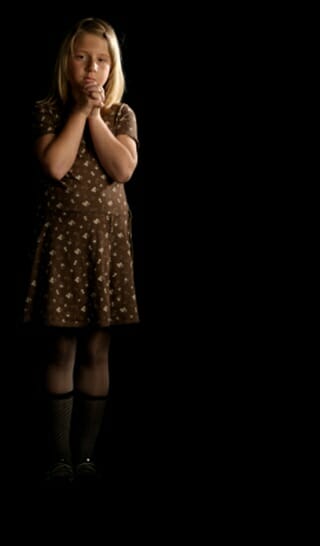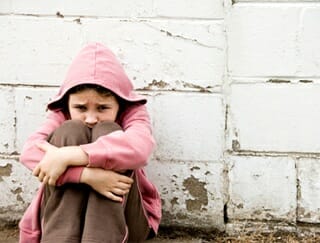PTSD and Child Sexual Abuse
Toward Healing the Victim of Molestation
 Sexual contact before sexual maturity with a peer, a family member, or someone else years older is known as molestation or child sexual abuse. If you experienced this, you may have many confused and painful feelings. You may even have PTSD, including anxiety, anger, shame, reactivity, and fear. This may be true even if you don’t have clear memories of what happened and even if you don’t know for certain who touched you inappropriately.
Sexual contact before sexual maturity with a peer, a family member, or someone else years older is known as molestation or child sexual abuse. If you experienced this, you may have many confused and painful feelings. You may even have PTSD, including anxiety, anger, shame, reactivity, and fear. This may be true even if you don’t have clear memories of what happened and even if you don’t know for certain who touched you inappropriately.
Young children often don’t remember things clearly, and older children may block those memories as a natural defense to manage the confusion and painful feelings. The lack of clear memories doesn’t mean it didn’t happen.
Healing the Present-Day Experience
I have found it best to help people stay very close to their present-day physical or emotional experience. This can be trusted even when the memories of what happened are confused. For example, if intercourse is confusing or scary to you or you have strong feelings of revulsion around certain sexual acts, you can work to feel and heal these feelings and sensations directly. It is not necessary and may not even be helpful to try to remember, guess at, or analyze why you feel these ways.
Sexual abuse of a child is a particularly painful boundary violation. Children don’t yet have well-developed boundaries and a sense of self. They don’t yet understand the powerful feelings often involved with sexual sharing, the natural right they have to the privacy of their own bodies, and the right they have to say “no” to any touching which feels uncomfortable or invasive. For these reasons, a child can be an easy and vulnerable target for a sexual predator or sexually confused adult who has not developed their own appropriate boundaries and sense of morality.
Children Often Blame Themselves
As adults discuss child sexual abuse, it is understandable then that most feel revulsion and disapproval towards the perpetrator, focus on the despicable nature of the act, and feel a desire to protect the innocent and vulnerable child.
What is often overlooked is how most children blame themselves, often secretly, and therefore suffer terrible guilt. There are several reasons for this. First, it is difficult for children to comprehend that an adult in their lives is “bad.” Children think in very concrete terms. It is impossible psychologically for a child to think, “My parent is good overall, but is doing a bad thing.” To believe that a parent is bad would be a terrifying and helpless situation. It is simply too overwhelming to be in a dangerous world or with a bad or out of control adult. It is more manageable for children to believe that they (the child) are bad and the parent is good. That way a hope remains alive that if they can just be better, the badness will go away and the child will feel safe.
Also, it is normal for young children to be self-oriented. It’s just the natural way children are. The child thinks mostly of how things impact themselves, and they try to figure out what to do to get what they want and avoid what doesn’t feel good. It takes years more maturity to realize that the universe doesn’t revolve around them, that other’s behavior and choices usually have nothing to do with them and are not their responsibility, even if the behavior has an impact on them.
So children just naturally feel that if someone touches them inappropriately, they (the child) must have done something to cause that, with resulting guilty feelings. When there is sexual contact between a minor and an adult, it is always the adult’s responsibility. When sexual contact occurs between unsupervised minors, it is always the responsibility of the responsible adults to be aware that something unsafe has happened and to address and stop the situation.
Family Dysfunctions
Many children who are sexually abused are in families which also have other dysfunctions or addictions present. They may be neglected, emotionally abused, or rarely touched. A child who is desperate for positive attention in a love-starved home is likely to have powerfully mixed feelings if they are touched sexually.
On the one hand, even young children usually instinctively feel the violation and experience that as “naughty” or shameful feelings, as described above. On the other hand, this may be the closest they have gotten to positive attention and touch for a long time. In spite of the invasion, they may like the attention of the adult. This can lead to shame lasting well into adulthood and make it difficult to talk with others about what happened and to get help healing.
What an adult seeking recovery needs to understand is that it is natural for children to want affection, a sense of belonging, and to feel special. These innocent and natural feelings of the child were taken advantage of if the interaction became sexual or secret in any way.
Shame
Many people feel deep shame about experiencing sexual pleasure during sexual abuse. It is important to understand the physiological fact that, unless fear or violence is involved, gentle genital stimulation generally feels pleasurable. This may be true even before sexual maturity and even when one would decline the touch or avoid the encounter.
Mature adults also may get into encounters they regret later because it felt good at the moment. A child may feel emotionally confused or repulsed by the contact and, even so, still experience arousal with the touch, even when it is unwelcome. For a child, this is not about a personal weakness. It is the way the body works. It is similar to walking through a kitchen full of delightful aromas and salivating even though one is not hungry and does not intend to eat.
Our bodies are not always in alignment with the emotional and energetic boundaries we might have or prefer to have. This is especially true for children who are lacking in clear, strong boundaries and don’t yet have emotional skills at managing confusing or conflicted feelings. Because of this vulnerability, children should be protected from such sexual experiences, particularly with adults or older children.
Learning to Say “No”
 Very small children are almost totally surrendered to their caregivers. Around age two, they begin to have the ability to say “no.” They begin to recognize themselves as separate from their mothers and that they have needs which may be different from their mother’s needs… the so-called “terrible twos.”
Very small children are almost totally surrendered to their caregivers. Around age two, they begin to have the ability to say “no.” They begin to recognize themselves as separate from their mothers and that they have needs which may be different from their mother’s needs… the so-called “terrible twos.”
But actually, this is a very healthy, necessary stage which begins a lifelong process of becoming responsible for oneself. If this process is handled well by the parents, if the child’s “nos” are not crushed as unreasonable rebellion, and the child is supported to discover its own will as much as practical while the parent still protects the child from any dangerous consequences, then that child begins to develop healthy boundaries. This includes a sense of “where I end and you begin” along with the ability to listen to one’s own feelings without too much distraction from social pressure, to find out whether one wishes to say “yes” or “no” to a given encounter.
One of the reasons sexual abuse is such a serious and often damaging violation is that it demands of the child, through psychological, emotional, or physical pressure, that they say “yes” even though they would otherwise instinctively say “no.” If the violator is a trusted caregiver, or the violation is frequently repeated, it teaches the child’s nervous system to mistrust their own instincts and feelings and to surrender to another even when they don’t want to. They learn to override their own important boundary and danger signals.
Such a boundary violation may leave a long-time scar on that child’s abilities to know their own feelings and to set boundaries as they grow up. Fortunately, healthy boundaries can be restored through the Somatic Experiencing work I offer.(Read more about healing with Somatic Experiencing.) You always have the chance to learn to listen to yourself and make new choices.
Letting Go of the Guilt

If you are trying to heal from sexual abuse that happened to you as a child, you must begin to realize that what happened was not your fault. Seek help from a qualified therapist and/or a support group. Re-read this webpage.
Know that it was the adult or older person perpetrating the abuse who was responsible, who should’ve had better judgment, controlled their impulses better, and had better boundaries. Perhaps they were abused, too, when they were young, but this is no excuse. By virtue of their relative age to yours, they had the responsibility to protect you, not take advantage of your innocence.
Your “inner child” may still feel guilty and ashamed for a while. That makes it all the more important that you cultivate the healthy “inner parent.” Try to repeatedly reassure yourself that you did nothing wrong, were innocent and understandably confused, and were given no real choice in the matter. Be patient and persistent in repeating this message over and over to yourself and to the child inside who may still feel bad, dirty, confused, or ashamed. The ways you got through and survived this are likely complex, and the patterns you developed to get through will not change overnight. The more loving and reassuring you can be to yourself, the sooner you will leave these painful episodes behind and join millions of others who have successfully healed from childhood sexual abuse.
